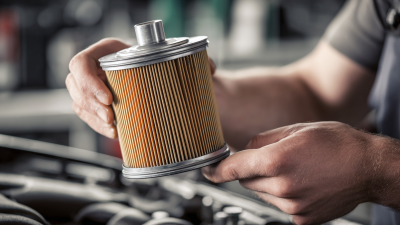 In the ever-evolving automotive industry, engine performance optimization is a crucial aspect of vehicle maintenance that directly impacts efficiency and longevity. One pivotal component in achieving superior engine performance is the Spin On Filter, a widely utilized oil filter that streamlines oil changes and enhances overall filtration efficacy. According to the International Journal of Engine Research, proper oil filtration can improve engine durability by up to 60%, illustrating the significant role that filters play in maintaining engine health.
In the ever-evolving automotive industry, engine performance optimization is a crucial aspect of vehicle maintenance that directly impacts efficiency and longevity. One pivotal component in achieving superior engine performance is the Spin On Filter, a widely utilized oil filter that streamlines oil changes and enhances overall filtration efficacy. According to the International Journal of Engine Research, proper oil filtration can improve engine durability by up to 60%, illustrating the significant role that filters play in maintaining engine health.
Spin On Filters offer considerable advantages over traditional filters, such as faster installation and superior filtration capacity. Their innovative design allows for a tighter seal and reduced risk of leaks, which prevents contaminants from entering the engine, ultimately leading to a cleaner and more effective lubrication system. Data from the Society of Automotive Engineers indicates that vehicles utilizing high-performance Spin On Filters can experience up to 8% improvement in fuel efficiency, thereby reducing operational costs.
By understanding the mechanics behind Spin On Filters and their impact on engine performance, vehicle owners can make informed decisions about their maintenance routines. As the automotive landscape becomes increasingly competitive, harnessing the benefits of advanced technologies like Spin On Filters not only boosts vehicle performance but also contributes to a more sustainable future for the automotive industry.
A spin-on filter is a type of oil filter that simplifies the process of oil changes for vehicle owners and mechanics alike. Unlike traditional filters, which may require complex installations, a spin-on filter comes pre-assembled and easily attaches to the engine with a simple twist. This design not only saves time during maintenance but also ensures a tighter seal, reducing the chances of leakage. The key features of spin-on filters include a built-in anti-drainback valve, which prevents oil from draining back into the engine when not in use, and a robust filter media designed to capture contaminants effectively.
Recent advancements have seen the development of the world's first reusable plastic spin-on oil filter module, highlighting a trend towards sustainability in automotive parts. Made from engineering plastic, this innovative design aims to reduce waste and promote a circular economy within the automotive industry. By using advanced materials, these filters not only maintain high performance but also enhance engine longevity and efficiency, appealing to environmentally conscious consumers. Such features reinforce the importance of spin-on filters in modern vehicle maintenance, contributing significantly to overall engine performance.
| Feature | Description | Benefits |
|---|---|---|
| Simplicity | Easy to install and replace. | Saves time and reduces maintenance complexity. |
| Filtration Efficiency | Designed for optimal filtration of oil contaminants. | Enhances engine protection and longevity. |
| Durability | Built with strong materials to withstand high pressure. | Reduces the risk of leaks and failures. |
| Oil Flow | Provides a consistent flow of oil to the engine. | Maintains proper engine lubrication, improving performance. |
| Size Variety | Available in various sizes to fit different vehicles. | Offers flexibility for diverse engine types. |
 Spin-on filters offer several advantages that can significantly enhance engine performance. One of the primary benefits is their ease of installation and maintenance. Designed like a screw-on cap, these filters can be quickly replaced without needing specialized tools or extensive mechanical knowledge, allowing for more frequent oil changes. Regular oil changes are crucial for maintaining engine efficiency, as clean oil helps lubricate moving parts, reduce wear, and lower the chance of overheating.
Spin-on filters offer several advantages that can significantly enhance engine performance. One of the primary benefits is their ease of installation and maintenance. Designed like a screw-on cap, these filters can be quickly replaced without needing specialized tools or extensive mechanical knowledge, allowing for more frequent oil changes. Regular oil changes are crucial for maintaining engine efficiency, as clean oil helps lubricate moving parts, reduce wear, and lower the chance of overheating.
Moreover, spin-on filters are engineered to provide superior filtration compared to traditional filters. They often incorporate advanced filtration media that trap smaller particles effectively, preventing contaminants from circulating within the engine. This heightened filtration capability results in cleaner oil, which is essential for optimal engine operation. Ultimately, by improving the quality of the oil circulating in the engine, spin-on filters contribute to better fuel efficiency, increased horsepower, and prolonged engine life. Their combination of user-friendliness and enhanced performance makes them a popular choice among car enthusiasts and everyday drivers alike.
Spin-on filters have gained popularity in automotive engineering, especially for their ease of installation and improved efficiency. Traditional oil filters typically require multiple components and a more complex setup, which can often lead to more potential points of failure. According to a study by the Society of Automotive Engineers (SAE), spin-on filters can reduce the installation time by up to 50%, significantly benefiting both manufacturers and mechanics.
One of the major advantages of spin-on filters is their ability to provide a tighter seal and better flow rates. This can increase oil circulation in the engine, leading to better lubrication. A report from the American Petroleum Institute (API) indicates that proper filtration can enhance engine performance by up to 20%, as cleaner oil helps in reducing wear and tear on engine parts.
**Tips for Choosing Oil Filters:**
- Always opt for a high-quality spin-on filter with an anti-drainback valve to prevent oil from draining back into the sump when the engine is off.
- Consider the manufacturer’s recommendations and specifications for optimal performance.
- Regularly check your oil filter to ensure it is not clogged or damaged, which can impede engine performance.

The performance of an engine can significantly improve with the right maintenance practices, especially concerning critical components like spin-on filters. These filters are designed to efficiently trap contaminants in the oil, thereby ensuring that the engine operates smoothly. According to recent industry studies, dirty oil can lead to a decrease in engine efficiency by up to 30%, highlighting the importance of keeping the fuel and oil clean. Spin-on filters play a crucial role in this process, as they enhance oil cleanliness, which, in turn, optimizes engine performance and durability.
To maintain optimal performance from your spin-on filter, regular inspections are essential. Experts recommend changing the filter every 3,000 to 5,000 miles, or as specified by the manufacturer's guidelines. Additionally, using high-quality oil and ensuring the use of clean fuel can drastically improve the filtration process, allowing for better removal of particulates that may degrade engine performance. In fact, fuel cleanliness has become a growing concern; recent reports indicate that stringent fuel cleanliness standards are increasingly demanding higher efficiency from fuel filters, further emphasizing the interconnectedness of filter health and overall engine performance.
When selecting the right spin-on filter for your engine, it's essential to consider several key factors that can significantly affect performance and durability. Firstly, it is crucial to match the filter to your specific engine requirements, which includes understanding the engine's make, model, and oil type. Each spin-on filter is designed with specific filtration properties and capacity, so using the correct one helps to ensure optimal oil flow and filtration efficiency.
Additionally, pay attention to the filter's micron rating, which indicates the size of particles that the filter can trap. A lower micron rating generally means better filtration but may also restrict oil flow if the filter is not suited for the engine’s operational demands. Moreover, consider the build quality and brand reputation; filters from trusted manufacturers often offer better construction materials and performance characteristics. By carefully evaluating these aspects, you can choose a spin-on filter that enhances your engine’s longevity and performance.






